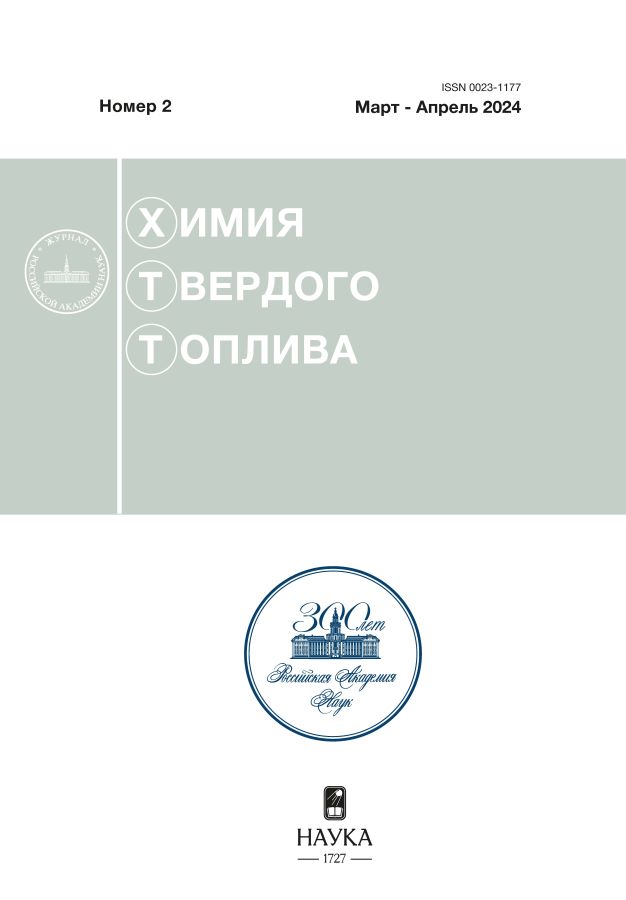Influence of Processing Conditions on the Properties of High Paraffin Oil and Sediment Composition
- Authors: Volkova G.I.1,2, Zubarev D.A.1
-
Affiliations:
- Institute of Petroleum Chemistry of Siberian Branch of the Russian Academy of Sciences
- National Research Tomsk State University
- Issue: No 2 (2024)
- Pages: 5-9
- Section: Articles
- URL: https://rjmseer.com/0023-1177/article/view/661562
- DOI: https://doi.org/10.31857/S0023117724020027
- EDN: https://elibrary.ru/OMXCNL
- ID: 661562
Cite item
Abstract
The influence of ultrasonic treatment, a polymer additive, and their combined effect on the structural and rheological properties of high paraffin, low-resin oil and the composition of separated sediments is studied. The oil was processed in the ultrasonic field (with the field intensity of 6 W/cm2, the frequency of 22 kHz, and the time of 1–10 min). The sedimentation process was carried out at an ambient temperature of 30°С and a coldfinger temperature of 5°С. A Brookfield DV-III ULTRA rotary viscometer was used to determine the viscosity-temperature parameters of the oil. Ultrasonic treatment for 1 min and a polymer additive (0.05 wt%) leads to a decrease in the viscosity by a factor of 5 and in pour point by 8°C. The introduction of the additive and the complex effect contribute to changes of the molecular weight distribution of n-alkanes in the sediments, viz. the second distribution maximum shifts to the region of higher molecular weight components and the concentration of n-alkanes ∑С17Н36–С33 Н68 increases.
Full Text
About the authors
G. I. Volkova
Institute of Petroleum Chemistry of Siberian Branch of the Russian Academy of Sciences; National Research Tomsk State University
Author for correspondence.
Email: galivvol@yandex.ru
Russian Federation, Tomsk; Tomsk
D. A. Zubarev
Institute of Petroleum Chemistry of Siberian Branch of the Russian Academy of Sciences
Email: zubarevdaniilandreevich@gmail.com
Russian Federation, Tomsk
References
- Chala G.T., Sulaiman S.A., Japper-Jaafar A. // J. Non-Newtonian Fluid Mech. 2018. V. 251. P. 69. https://doi.org/10.1016/j.jnnfm.2017.11.008
- Гаррис Н.А., Полетаева О.Ю., Бакиев Т.А. // Транспорт и хранение нефтепродуктов и углеводородного сырья. 2020. № 3. С. 64. https://doi.org/10.24411/0131-4270-2020-10311 [Transport and Storage of Oil Products and Hydrocarbons, 2020, no. 3, p. 64. https://doi.org/10.24411/0131-4270-2020-10311].
- Ansari F., Shinde S. B., Paso K. G., Sjöblom J., Kumar L. // Energy & Fuels. 2022. V. 36. P. 3372. https://doi.org/10.1021/acs.energyfuels.1c03747
- Литвинец И.В., Юдина Н.В., Лоскутова Ю.В., Прозорова И.В. // Нефтяное хозяйство. 2018. № 2. С. 85. https://doi.org/10.24887/0028-2448-2018-2-85-89 [Oil industry, 2018, no. 2, p. 85.]
- Afra S., Hisham A., Nasr-El-Din H., Socci D., Zheng Cui. // Fuel. 2018. V. 220. P. 481. https://doi.org/10.1016/j.fuel.2018.01.111
- Казанцев О.А., Волкова Г.И., Прозорова И.В., Литвинец И.В., Орехов Д.В., Самодурова С.И., Каморин Д.М., Мойкин А.А., Меджибовский А.С. // Нефтехимия. 2016. Т. № 1. С. 76. https://doi.org/10.7868/S0028242115040073 [Petroleum Chemistry, 2016, vol. 56, no. 1, p. 68. https://doi.org/10.1134/S0965544115060079]
- Wang Z., Fang R., Guo H. Advances in ultrasonic production units for enhanced oil recovery in China // Ultrason. Sonochem. 2020. V. 60. P. 104791. https://doi.org/10.1016/j.ultsonch.2019.104791
- Hofstatter H., Pavlov M.V., Mastobaev B.N. // SOCAR Proc. 2014. № 4. P. 35. https://doi.org/10.5510/OGP20140400219 [Научные труды НИПИ Нефтегаз ГНКАР. 2014. № 4. С. 35. https://doi.org/10.5510/OGP20140400219].
- Abramov V.O., Abramova A.V., Bayazitov V.M., Altunina L.K., Gerasin A.S., Pashin D.M., Mason Timothy J. // Ultrasonics Sonochemistry. 2015. V. 25. P. 76. https://doi.org/10.1016/j.ultsonch.2014.08.014
- Cui J., Zhang Z., Liu X., Liu L., Peng J. // Fuel. 2020. V. 263. 116638. https://doi.org/10.1016/j.fuel.2019.116638
- Абрютина Н.Н., Абушаева В.В., Арефьев О.А. Современные методы исследования нефтей: Справочно-методическое пособие. Под ред. А.И. Богомолова, М.Б. Темянко, Л. И. Хотынцевой. Л.: Недра, 1984. 431 с.
- Морозова А.В., Волкова Г.И. // Химия в интересах устойчивого развития. 2020. № 28. С. 508. https://doi.org/10.15372/CSD20202570 [Chemistry for Sustain able Development, 2020, vol. 28, p. 494].
- Методика идентификации органических соединений в смесевых композициях синтетического и природного происхождения методом хроматомасс-спектрометрии. СТП СШЖИ 1232-2009, 2009. 3 с.
- Anufriev R.V., Volkova G.I. // Key Engineering Materials, 2016. V. 670. P. 55. https://doi.org/10.4028/scientific.net/KEM.670.55
- Ануфриев Р.В., Волкова Г.И. // Известия Томского политехнического университета. Инжиниринг георесурсов. 2016. Т. 327. № 10. С. 50. [Bulletin of the Tomsk Polytechnic University. Geo Аssets Engineering, 2016, vol. 327, no. 10, p. 50].
Supplementary files














